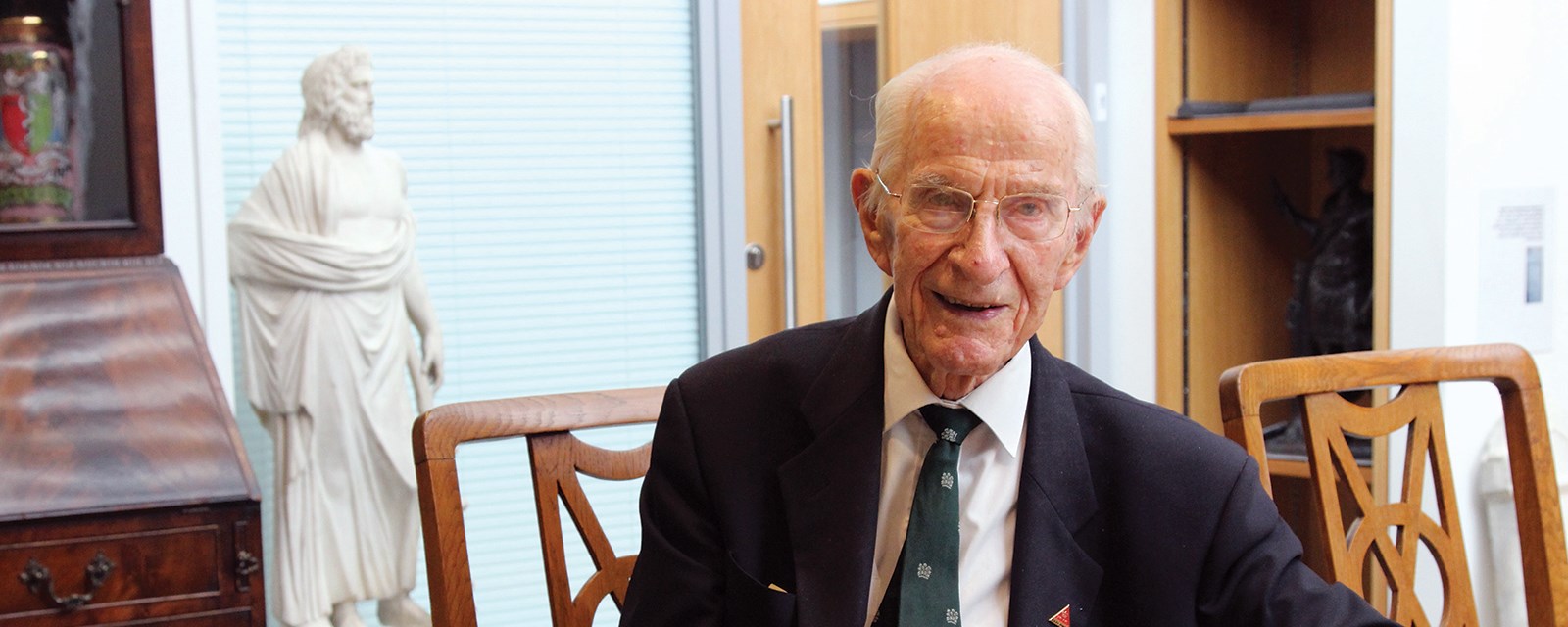
Remembering Dr Bill Frankland
Pioneer in allergy research
The RSM were sad to hear that Dr Bill Frankland, believed to be our longest serving member, has died aged 108. To honour and celebrate his life, we reproduce here our interview with Dr Frankland in 2015, when he was recognised in the Queen's Birthday Honours list with an MBE.
It was with great pleasure and anticipation that the RSM News team met up with Dr Frankland, a member for almost 70 years, when he came into the Library to talk about his rich and varied career.
Qualifying in 1938 after studying medicine at The Queen’s College, University of Oxford and St Mary’s Hospital Medical School, he joined the Army Medical Corps as a civil medical practitioner (CMP) on a salary of £1 a day when war broke out in 1939.
At an army hospital on Salisbury Plain during his first job, he single-handedly managed a meningitis outbreak losing only a single patient out of 100 cases. Other epidemics followed, including one of mumps when 234 Australian troops stationed in the UK had the rare complication of encephalitis. This Dr Frankland wrote as one of his first pieces of published work (he has had four papers published since becoming a centenarian).
Then in 1942, Dr Frankland was given two days training in tropical medicine before being posted to Singapore, arriving seven days before the attack on Pearl Harbour. After the Fall of Singapore he spent the rest of the war as a medical officer treating his fellow prisoners of war in the Japanese forced labour camps and sharing the same horrific privations.
On his return to England Dr Frankland decided he would shelve his wartime experiences, preferring instead to focus on his career. It is only relatively recently that he made the decision to talk about his time as a Far East Prisoner of War and has been sought-after by TV and radio. In 2015, he took part in a BBC R4 episode of The Reunion with Sue MacGregor and, following a guest appearance with Kirsty Young on Desert Island Discs, he joined her on TV during the recent commemorations to mark the 70th anniversary of VJ Day.
In 1946, back at work at St Mary’s, Paddington, Dr Frankland began work as a dermatologist, spending two days a week in the allergy clinic. Fascinated by this little-known area of medicine, he decided to devote his career to allergy, conducting the first ever double blind controlled trial on antihistamines to help asthma. This was followed by another double blind trial, this time focusing on an asthma vaccine developed by his boss at St Mary’s. He didn’t believe the theory behind the vaccine and, using statistics from the trial, was able to prove that the vaccine and saline were of equal value.
This work piqued the interest of Nobel Prize winner Alexander Fleming and Dr Frankland went on to present his research paper to international gatherings in Madrid and California. Highly impressed by Dr Frankland’s work, Alexander Fleming commissioned him to contribute a new chapter on penicillin sensitivity for the 2nd edition of his penicillin ‘bible’* for the medical profession.
With his reputation firmly established as the UK’s leading allergy specialist, Dr Frankland continued his work at St Mary’s, going on to invent the pollen count which continues to be seen on our weather forecasts every day during the summer.
Dr Frankland retired from St. Mary’s Hospital, Paddington aged 65 but continued to work at Guy’s Hospital for the next 20 years. He is, indeed, an inspirational character, full of warmth, wit and humour.
*Penicillin: its practical application, 2nd edition, A Fleming, pub. London 1950, Butterworth & Co. Available in the RSM Library.
